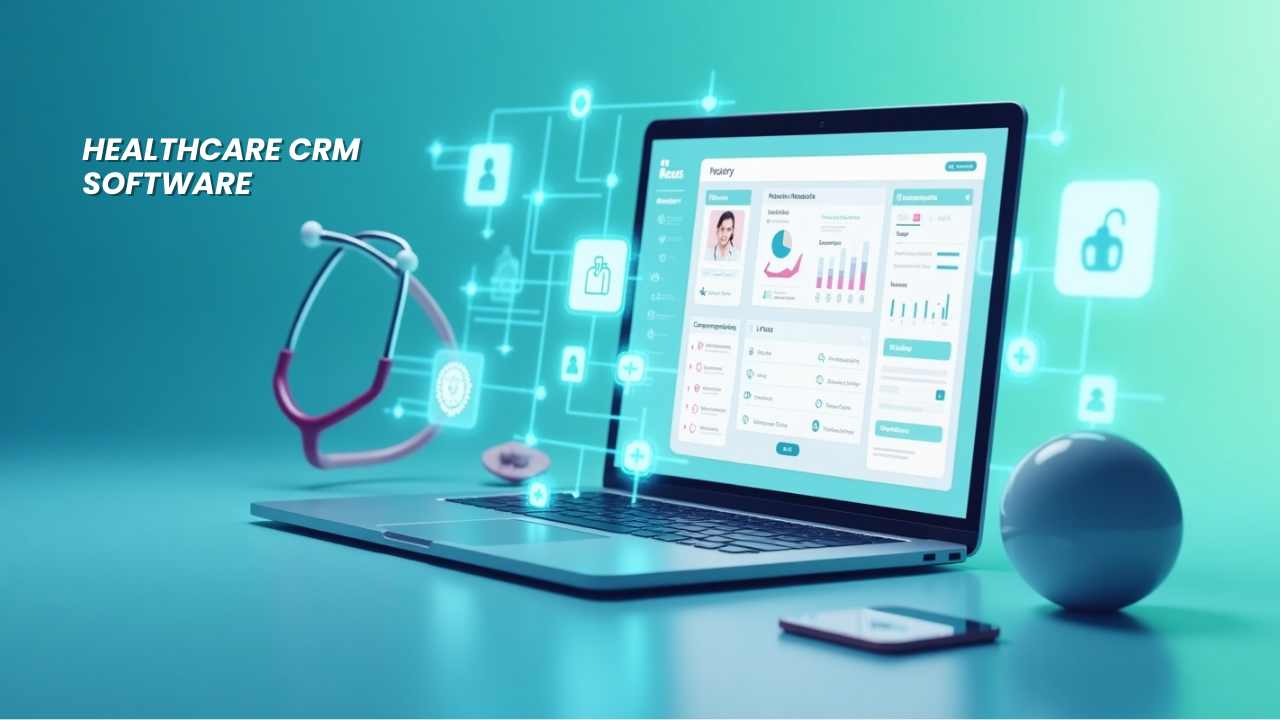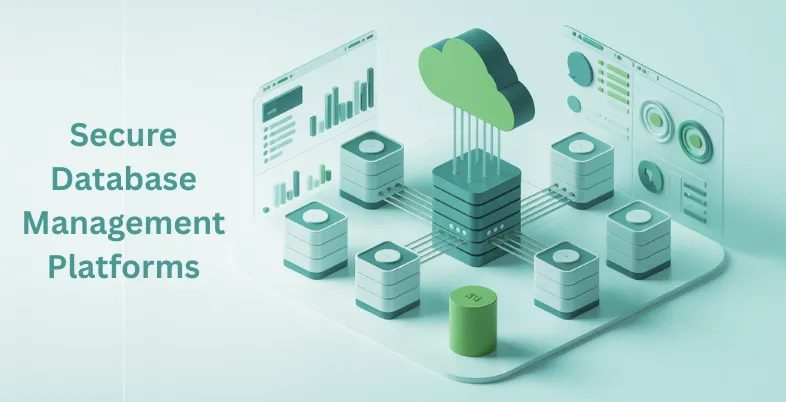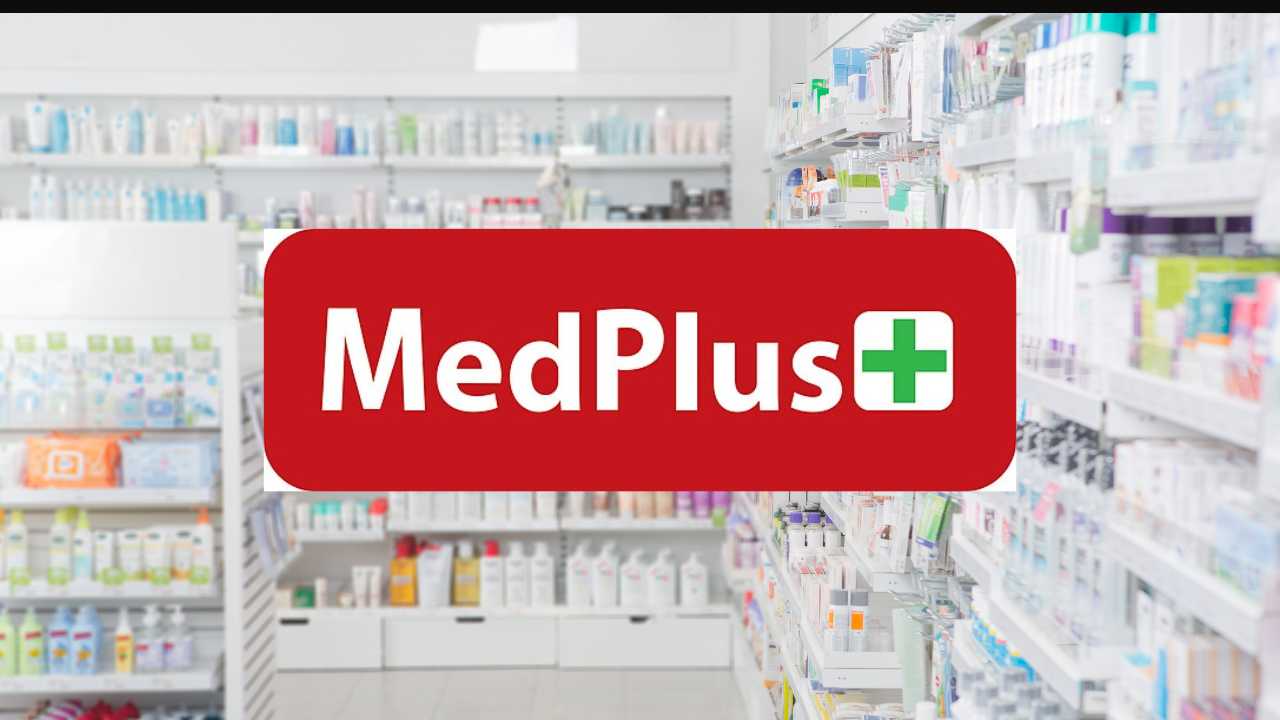The modern healthcare environment requires advanced tools to handle the relationships with its patients, streamline the operations, and be in compliance with the regulations. In 2025, there will be considerable changes in the market of healthcare CRM software, where the dominant solutions are based on AI. These customer relationship management systems are also specialised as they solve the problems that healthcare providers encounter in their day to day operations.
The adequate CRM has the potential to transform the healthcare delivery process by organizing the patient data, arranging the care teams, and automating the administrative processes. The industry is already seeing over 1,800 hospitals and other healthcare organizations utilizing some form of CRM and being able to choose the best platform to use has become a priority in terms of gaining competitive edge. This guide offers the best solutions that healthcare organizations can rely on to come up with sound decisions that will improve patient care without compromising on compliance levels.
What Is Healthcare CRM Software?
Healthcare CRM Software is a CRM software specific to medical organizations to maintain relations with patients, automate their administrative tasks, and be compliant with regulations. In contrast to the conventional CRM, these platforms have been specifically designed to include patient journey mapping, scheduling and tracking of appointments, medical history, and care coordination.
Such systems should meet the strict healthcare standards, especially the HIPAA requirements, where patient data has to be safe and confidential. The contemporary healthcare CRM systems are built to seamlessly connect with electronic health records (EHR), practice management systems, and billing platforms to establish a cohesive environment in which healthcare delivery happens. They allow medical professionals to automatically send messages to patients, monitor patient treatments, process referrals, and empower them with patient data to deliver high-quality care at lower costs and decreased administrative workload.
Why CRM Is Important in the Healthcare Industry
Healthcare CRM software have emerged as essential tools of contemporary medical practices, and there are many advantages to them:
- Enhanced Patient Experience: CRMs enable CRM to communicate with patients in a distinct manner by offering them a comprehensive account of the health history, automated reminders regarding the appointment, and personalized communication preferences that would result in an enhanced patient experience and patient engagement.
- Operational Efficiency: Automated workflows make administrative processes like appointment booking, verification of insurance, and follow-up messages easy so that the healthcare personnel is not so preoccupied with administrative tasks rather than patient care.
- Regulatory Compliance: CRM systems that are HIPAA compliant ensure patient data is safe and allows complying with the legal framework and avoid the violation of the laws, high cost of fines, and maintaining trust in the patient.
- Data-Driven Insights: Data-driven insights may be a good way to help healthcare providers identify trends, track patient outcomes, and make appropriate decisions concerning treatment processes and resource distribution.
- Care Coordination: CRMs promote easy communications between various healthcare providers, specialists and departments to ensure that care is continuous and minimise medical errors.
- Optimization of revenue: The CRMs aid organizations in the healthcare industry to optimize their revenue by monitoring the interactions with patients, avoiding waste of resources on the referrals process and boosting the possibilities of providing further services.
Core Features of a Healthcare CRM System
The important attributes of a good healthcare CRM system are:
- Patient Data Management: Comprehensive patient files containing medical history, contact details, insurance cover, treatment regimes, and communication preference that are stored safely and accessed according to the role.
- Appointment Scheduling: Calendar tool that automatically schedules appointments, waitlists, and sends reminder messages and the provision of real-time availability by provider and location.
- Communication Tools: Multi-channel communication functionalities such as secure messaging, email campaigns, SMS notifications, and patient portal integration to ensure all information has been exchanged between the patients and providers.
- Compliance Features: The integrated HIPAA compliance, such as data encryption, audit trail and user authentication and access controls to ensure safe storage and handling of sensitive patient data and adhering to the regulations.
- Connectivity Functions: Seamless connection with other medical systems such as EHRs, practice management systems, billing systems and medical devices to create a shared healthcare space.
- Analytics and Reporting: Sophisticated reporting capabilities helping to understand patient satisfaction, treatment outcome, operational efficiency, and financial performance so that data-based decision making is used to improve continuously.
Comparison Table of Healthcare CRM Tools
| Name | Specialty | Starting Price | Integration Support |
| Salesforce Health Cloud | Comprehensive Patient Engagement | $150/user/month | Extensive healthcare integrations |
| LeadSquared Healthcare | Marketing Automation | $25/user/month | Good third-party connectivity |
| HubSpot Healthcare CRM | Inbound Marketing | Free tier available | Strong marketing tool integrations |
| Monday.com Healthcare | Visual Workflow Management | $8/user/month | Popular app integrations |
| FreeAgent CRM | Life Sciences Focus | $19/user/month | Healthcare-specific integrations |
| Zoho CRM Healthcare | Affordable Customization | $14/user/month | Extensive third-party support |
| Microsoft Dynamics 365 | Enterprise Integration | $65/user/month | Microsoft ecosystem integration |
| Cured by Innovaccer | AI-Powered Analytics | Custom pricing | Comprehensive healthcare systems |
| Kohezion Healthcare | Custom Applications | $15/user/month | Flexible integration capabilities |
| Epic Systems Cheers | Hospital Systems | Enterprise pricing | Epic EHR integration |
Top 10 Healthcare CRM Software in 2025
1. Salesforce Health Cloud
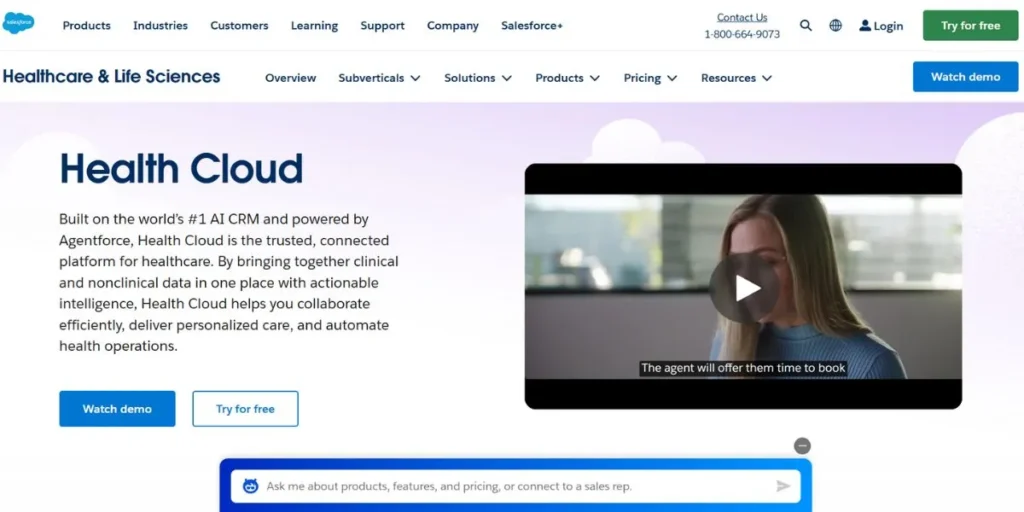
Salesforce Health Cloud is the most effective tool to minimize operational expenses and bring efficiency. As a leading healthcare CRM software, it is an end-to-end platform that revolutionizes patient engagement with the help of AI that provides actionable data and tools to manage care. The system is excellent when it comes to handling complex patient journeys and giving healthcare teams 360-degree patient views. Intended to address the needs of healthcare organizations that have to engage patients comprehensively and coordinate their care.
The strength of its integration functionality allows it to integrate flawlessly with the rest of the healthcare infrastructure and thus it is more suited to large health organizations that are looking at a complete digital transformation.
Key Features
- predictive analytics, Patient insights AI
- Automated workflow in the care plan management
- Patient engagement platform that is multi-channel
- Care team real-time collaboration tools
- More security and all audit records
Compliance: Security Salesforce Health Cloud is HIPAA compliant with a high level of security measures and data protection.
Ideal Use Case: Designed specifically for healthcare organizations requiring comprehensive patient engagement and care coordination.
Pricing Model
- Health Cloud: $300 to each user per month
- Professional Version: $150 per user a month
- Enterprise Edition: $300a month per user
- Custom prices can be obtained at large organizations
Pros: All-purpose platform with a lot of customization and integration possibilities.
Cons: Difficult to implement and has a steep learning curve when dealing with new users.
2. LeadSquared Healthcare CRM
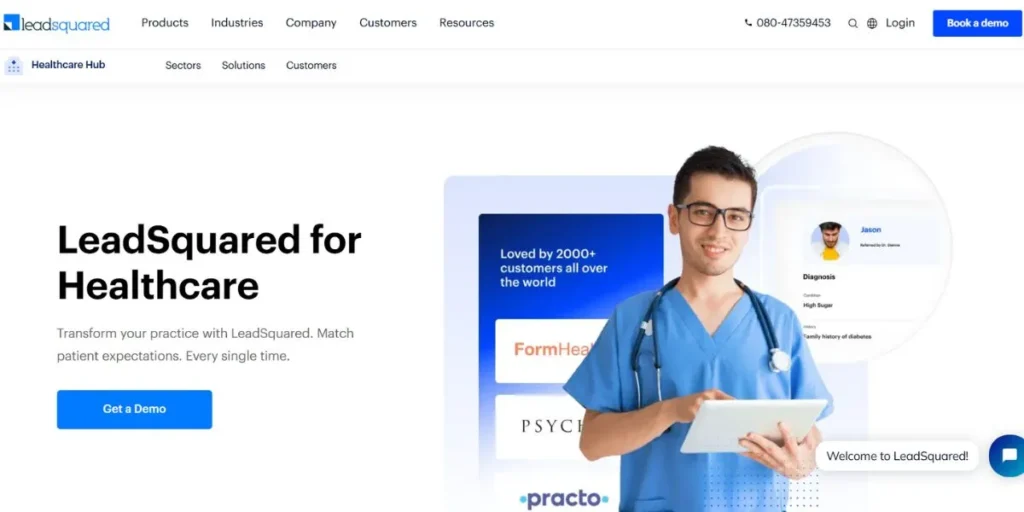
LeadSquared is the best marketing automation solution to reach out to patients. As a powerful healthcare CRM software, this solution is focused on patient acquisition and patient retention with the help of advanced marketing processes and lead nurturing campaigns. The system provides strong automation features that speed up the process of onboarding patients and ensure that there is a personal touch in communication. It has an intuitive interface, which makes it easy to use by even less technical members of the healthcare teams.
Key Features
- Fine-tuned marketing automation with segmentation of patients
- Nurture and lead scoring
- Management of campaign multi channel
- Live reporting, reporting
- Patient engagement tools that are optimized to be used on mobile devices
Compliance: LeadSquared has full HIPAA compliance because of Business Associate Agreements and safe management of patient health data.
Ideal Use Case: Fits healthcare practices that have a patient-focused practice and a growth strategy on marketing (customer acquisition).
Pricing Model
- Lite: $25 a user a month
- Pro: $50 a month/user
- Super: $100 a month per user
- Enterprise: It is possible to customize the pricing
Pros:Good marketing automation systems with friendly interface and an integrated reporting system.
Cons: Does not have the same sort of advanced healthcare-specific features as medical CRMs.
3. HubSpot Healthcare CRM
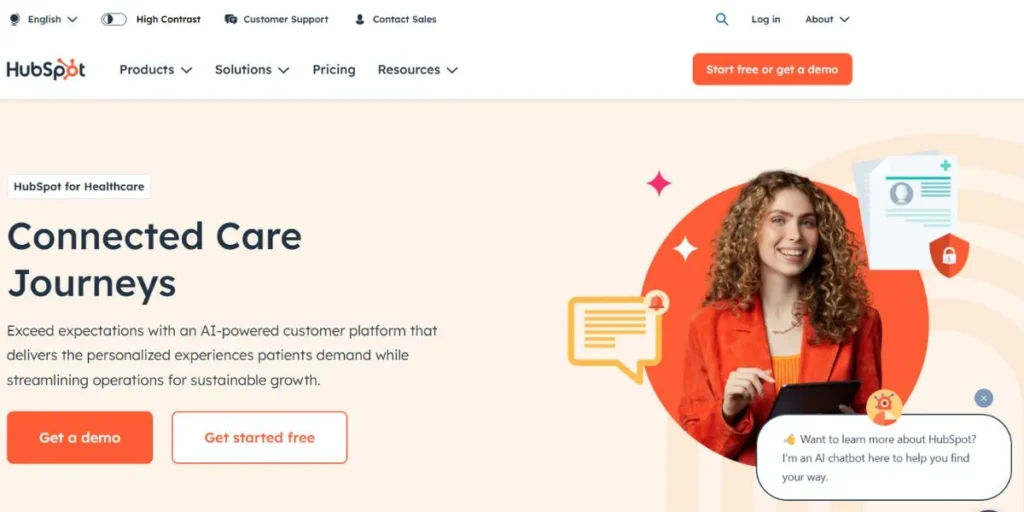
HubSpot is a healthcare-oriented customer relationship management tool that offers a complete platform to manage the relationship with patients and heavily emphasizes inbound marketing principles. As a healthcare marketing tool, The system is excellent in content management, lead generation and patient education programs. Its freemium structure means that it is affordable to even the small healthcare practice and it can be scaled to larger organizations. The support that the platform provides in the form of education and community helps healthcare teams implement it with fewer difficulties.
Key Features
- The functionality of a free tier of CRM
- Patient education aids Content management aids
- Automation workflow, email marketing automation
- Social media tracking and social interaction
- Analytics dashboard and reporting at high level
Compliance: HubSpot also has HIPAA compliant functionality with signed BAAs at the Professional and Enterprise plans.
Ideal Use Case: Appropriate to small and medium medical practices who are keen on patient education and inbound marketing.
Pricing Model
- Free: $0 (basic features)
- Starter: $45 a month
- Professional: $800 a month
- Business: $3200/month
Pros: Free tier is very good and includes all educational materials and a powerful community.
Cons: Healthcare-specific functions are only available on a higher subscription level with extra payments.
4. Monday.com Healthcare CRM
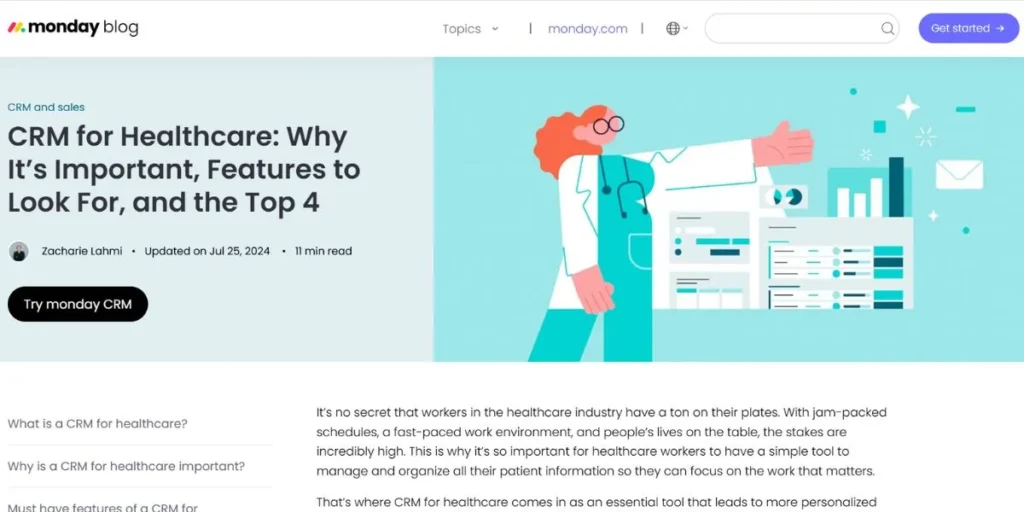
Monday CRM also provides individual patient care by using smart boards and patient tracking systems. This visual project management tool can be perfectly adjusted to fit the healthcare processes, providing convenient patient management boards, appointment schedule boards, and care coordination boards. The flexibility of the system enables medical teams to tailor workflows to their unique requirements without losing the visibility of the entire interaction with patients.
Key Features
- Board Visual workflow management
- Tracking of patients and medical record organization
- Alerts and auto-mails
- Teamwork products and document sharing products
- Connection with the popular health applications
Compliance: Monday.com has HIPAA-compliant functionality that makes handling of sensitive patient information secure.
Ideal Use Case: Suitable when it comes to healthcare teams that want visual workflow management and collaborative patient care strategies.
Pricing Model
- Basic: $8 a month per user
- Standard: $10 a user a month
- Pro: $16 a month per user
- Business: Custom prices
Pros: Very visual and intuitive interface, great collaboration abilities and a good level of customization.
Cons: Might be missing some of the specialized healthcare-specific analysis features that a specialized medical CRM would have.
5. FreeAgent CRM
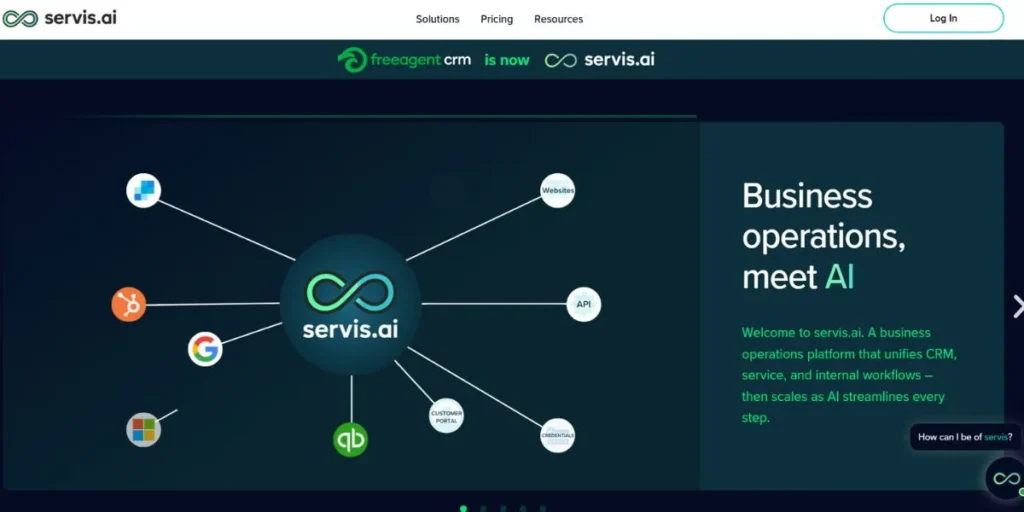
FreeAgent CRM is the #1 user-rated healthcare CRM software in the life sciences and healthcare sector, with products made specifically to suit clinics, biotech, and pharmaceutical companies. It is a very simple and at the same time all-encompassing solution that is centered around the principles of simplicity without compromising on functionality. The platform is best at handling complex sales cycles in the healthcare sector, as well as offering powerful patient relationship management features that suit a healthcare setting.
Key Features
- Healthcare workflow industry templates
- Advanced pipeline management of patients The pipeline management of patients is advanced.
- Communication and email marketing tools that are integrated
- Good dashboards and reporting
- On-the-go mobile application
Compliance: FreeAgent CRM is HIPAA compliant, and the security and data protection requirements of the enterprise level.
Ideal Use Case: It is targeted at life sciences companies, biotech firms, drug companies and specialized medical clinics.
Pricing Model
- Professional: $19 per user a month
- Enterprise: $39 /user/month
- Premium: $59 a month and a person
- Enterprise solutions that satisfied Customers provided
Pros: Easy to use yet powerful interface that has great user ratings and industry specific features.
Cons: It might not have more advanced functionalities of large CRMs.
6. Zoho CRM Healthcare
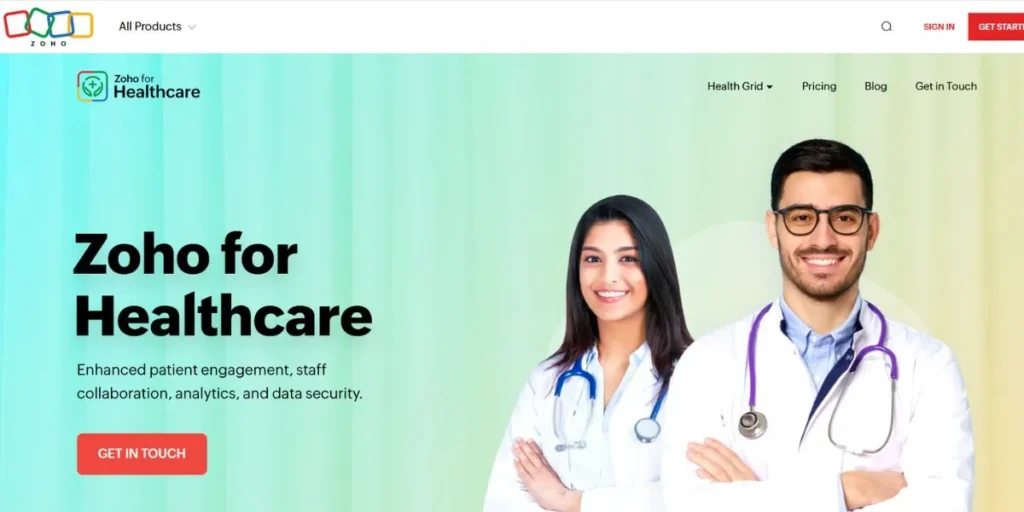
Zoho CRM Healthcare comes as an all-encompassing solution tailor made to meet the needs of medical practices that want to manage patient relationships at affordable and yet powerful levels. The platform has a great degree of customization, which facilitates adaptation of the system to the specific needs of a healthcare organization and its workflows. It has an AI-based assistant, Zia, which helps healthcare teams to make decisions based on data and automates menial work and provides predictive information.
Key Features
- Predictive analytics with the help of AI-based assistant
- Automation of work and optimization of the workflow
- Diversity management of communication channels
- Dynamic reporting and dashboards customization
- High third party integrations
Compliance: Zoho CRM has been HIPAA compliant as a Business Associate with complete security to protect the data.
Ideal Use Case: It is the right fit in small and medium healthcare practices that demand low-cost but customizable CRM packages with AI functionalities.
Pricing Model
- Standard: $14 US per user per month
- Professional: $23 / per user/ per month
- Enterprise: $40 /month/user
- Ultimate: $52 a month / user
Pros: Low price yet all the features and good customization opportunities.
Cons: The interface is overwhelming to new users as there are numerous features to choose from.
7. Microsoft Dynamics 365 Healthcare
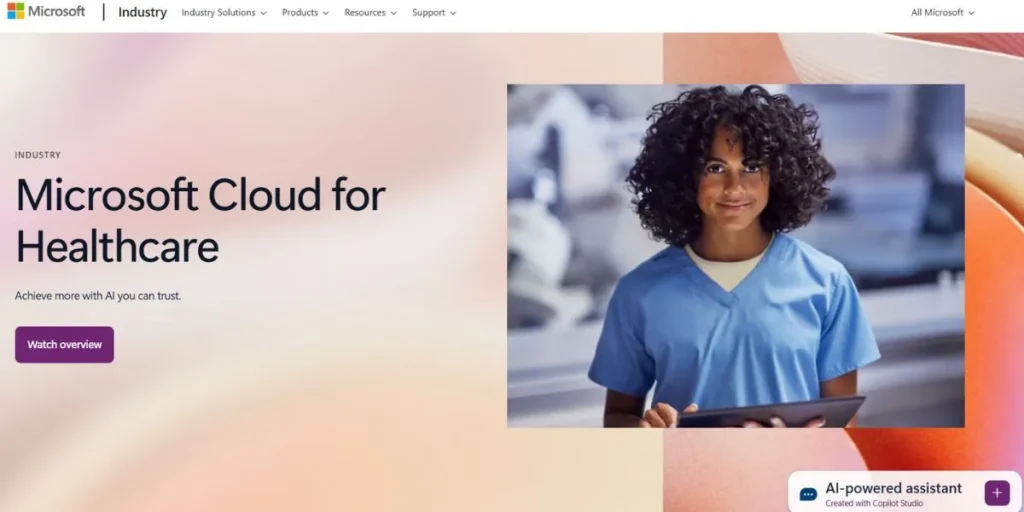
Microsoft Dynamics 365 Healthcare provides collaboration among the care teams developing individual care plans, makes appointments, and informs patients about changes. As a robust healthcare CRM software, it is an enterprise-level solution that fits well within the Microsoft ecosystem, offering familiar interfaces to organizations already using various Microsoft products. The platform is best suited for large-scale deployments and has superior security attributes and detailed analytical capabilities.
Key Features
- Uninterrupted Microsoft office integration
- Management of advanced care plans and cooperation
- Self-service patient portal
- End-to-end business intelligence
- Security and compliance enterprise functionality
Compliance: Microsoft Dynamics 365 provides enterprise level security and audit capabilities and HIPAA compliance.
Ideal Use Case: Suitable in the case of large healthcare companies and hospital networks already using Microsoft ecosystem.
Pricing Model
- Sales Professional: $65 per user a month
- Sales Enterprise: $95 / per user / per month
- Customer service professional: $95 per month per user
- Healthcare packages on offer
Pros: It works very well with Microsoft products and has very strong enterprise level features and security.
Cons: It can be costly and complicated to the point that smaller healthcare practices may not need it.
8. Cured by Innovaccer
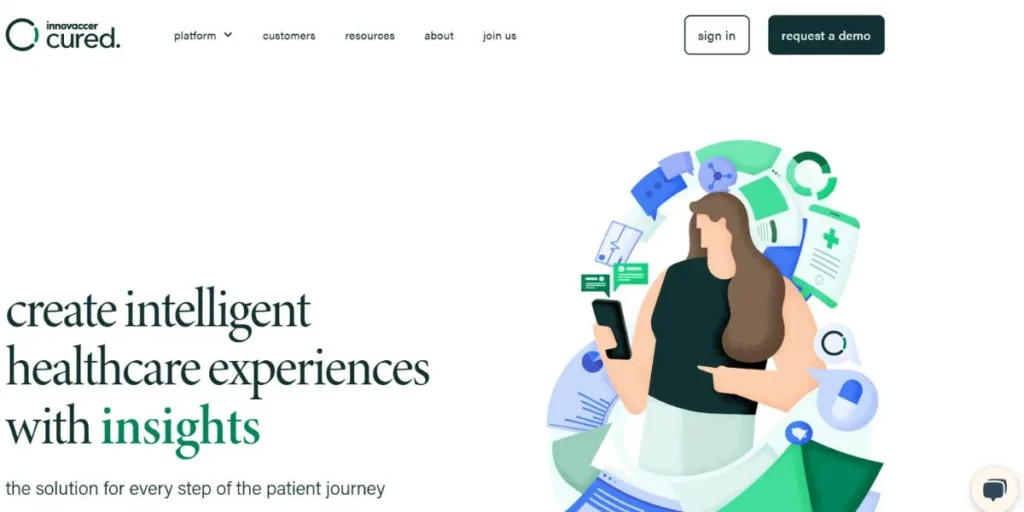
Innovaccer Cured remains the leader in the healthcare CRM category in 2025 and takes a sensational 94.5 score in the Best in KLAS report, a second consecutive time. This platform is an AI-based specialty in patient engagement and population health management. The system offers an in-depth patient journey mapping and predictive analytics to enhance care outcomes and cut down on costs.
Key Features
- AI patient engagement analytics
- Services in population health management
- Gap identification and gap closure workflows of care
- Mapping and optimization of patient journey
- End-to-end health systems interoperability
Compliance: Cured is fully HIPAA compliant and has the most robust security measures and healthcare-related protection.
Ideal Use Case: Designed to fit the population health management organizations and patient engagement through the application of artificial intelligence.
Pricing Model
- Contact us to get custom pricing depending on the size of the organization
- Tiers pricing can be offered with various sets of features
- Training and implementation services were included.
- Large healthcare systems volume discounts
Pros: AI features that are industry-leading and have high user satisfaction levels and a wide focus on healthcare.
Cons:The cost of the Cons Premiums can be too expensive for smaller healthcare practices.
9. Kohezion Healthcare CRM
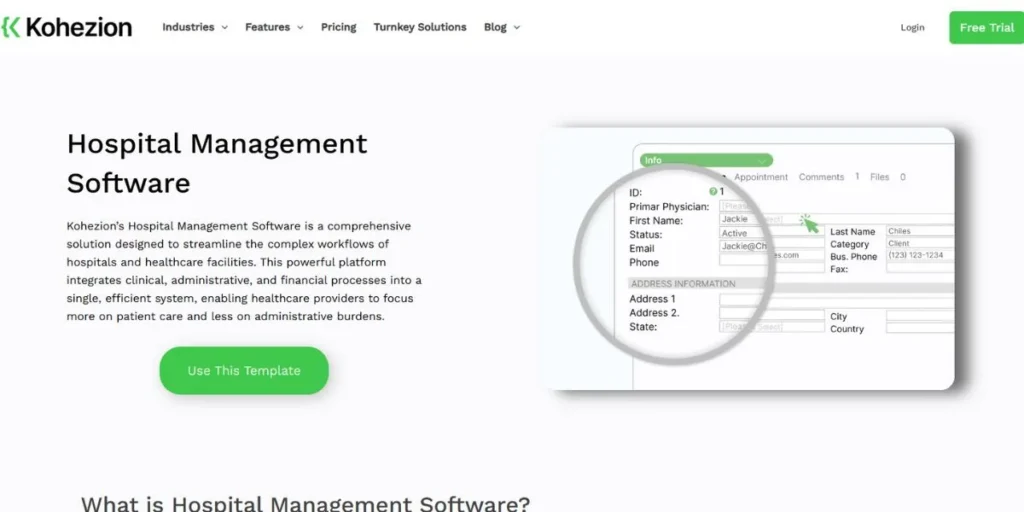
Kohezion is a market leader in HIPAA-compliant healthcare CRM software, and its business software is highly customizable to suit the needs of a given healthcare organization. The focus of this platform is automation and customization, which means that healthcare organizations can create workflows that align with their specific needs. The system is also very useful in the development of customized databases and automation systems that facilitate the ease of healthcare operations.
Key Features
- Advanced framework application builder
- Auto-generation and control of workflow
- Healthcare database functions
- Analytics and high performance report engines
- Incorporation into the current healthcare systems
Compliance: Kohezion offers in-depth HIPAA compliance with the best security practice in the industry.
Ideal Use Case: Scenario Suitable to those healthcare organizations where the CRM systems need to be highly customized and their workflow needs are unique.
Pricing Model
- Basic: $15 a user month
- Enterprise: $25/user / month
- Enterprise: $35 a month a user
- Special prices in tailor-made solutions
Pros: It possesses excellent customization features that include strong automation attributes and leadership on HIPAA compliance.
Cons: May need technical skills to implement and customize in the best way.
10. Epic Systems Cheers
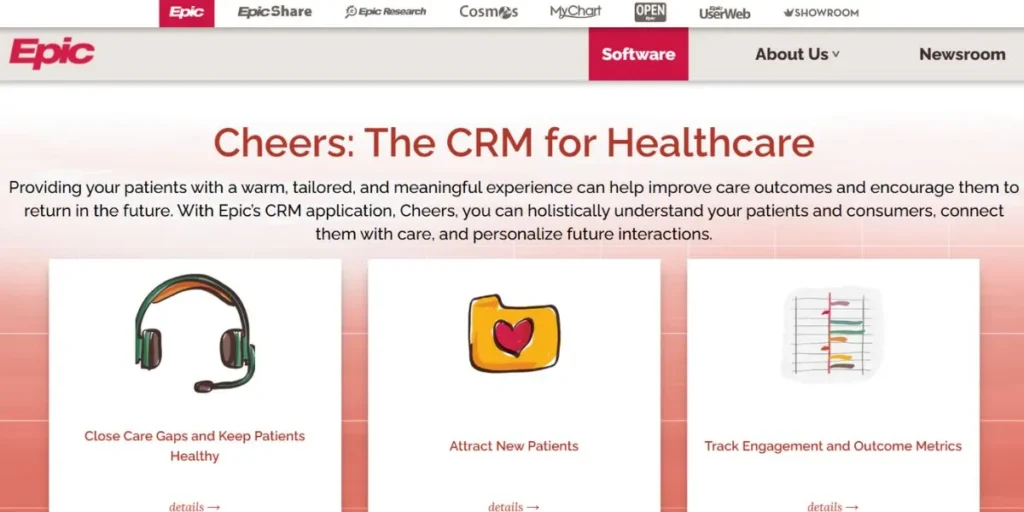
Cheers by Epic Systems Corporation is the market leader in healthcare CRM with 428 installations and 22.4 percent market share amongst hospitals. This enterprise-level product is compatible with the Epic EHR systems that are considered to be the most well-known, and it allows managing the patient relationships comprehensively in a familiar healthcare setting. The platform is strong in large hospital systems and integrated health networks that need advanced capabilities in patient engagement.
Key Features
- Integration of Epic EHR without problems
- Patient engagement enterprise level tools
- The role of the holistic care coordination is.
- Population health and high-order analytics
- Large healthcare systems architecture
Compliance: Epic is a HIPAA-compliant enterprise level security and healthcare industry practices.
Ideal Use Case: This is intended to be used in hospitals and large healthcare systems especially those that currently use Epic EHR systems.
Pricing Model
- Enterprise license model
- Epic will have custom pricing
- The implementation services were provided:
- The price of maintenance and support
Pros: The leading adoption rate with a great EHR integration and broad hospital-centric features.
Cons: Cost and complexity is extreme, is only applicable to large healthcare organizations with large IT resources.
Benefits of Using CRM in Healthcare
The transformative value of healthcare CRM software completely changes how patient care and efficiency is done:
- Enhanced Patient Satisfaction: CRMs allow a more personal experience with the patient by tracking their full health record, managing their preferences, and providing customized communication strategies, which leads to increased patients satisfaction scores and better patient loyalty.
- Improved Care Coordination: Free flow of information among healthcare providers, specialists, and departments will enhance continuity of care, minimise medical errors and treatment outcomes by enhancing collaboration.
- Cost Reduction: The CRM systems may substitute a variety of software packages, lowering costs and enabling more efficient use of resources, and automate administrative activities as well as streamline workflow to reduce operational costs.
- Advanced analytics can be employed to interpret the trends of patient care, treatment efficacy and operations of an organization to make informed decisions that can be used to improve the quality of care and the business performance of the healthcare organizations.
- Regulatory Compliance Management: CRM software that conforms to the HIPAA regulation reduces the chances of expensive non-conformance issues and the security of the patient data is taken care of as well as the ongoing trust is taken care of by proper processes of handling of information.
- Revenue Growth Opportunities: CRMs are useful in determining potential cross-selling opportunities, referrals, monitoring costs of acquiring patients, and maximizing marketing campaigns which are sustainable in growing revenue and resultant financial performance.
Key Challenges with Healthcare CRMs (and How to Overcome Them)
There are a number of issues that healthcare organizations encounter in the process of implementing CRM systems, however, strategic solutions to these barriers can be found:
- Data Integration Complexity: Healthcare institutions do not always manage to connect the CRM systems to the currently used EHRs, management software, and billing programs. Solution: Select CRMs that have ready-made integrations with healthcare systems and collaborate with vendors providing full implementation services so that data transfer between systems becomes smooth.
- Resistance to User Adoption: The healthcare staff might be reluctant to a new technology out of time and fear of disruption of the previously set up workflow. Solution: This can be solved by adopting extensive training programs, engaging staff in the selection processes of the system to be adopted and showing clear advantages by conducting pilot programs prior to full implementation.
- Compliance and Security Issues: Healthcare providers should also ensure that CRM systems meet high standards of healthcare needs and healthcare requirements of HIPAA. Solution: Choose HIPAA-compliant CRM vendors exclusively, provide clear data governance policies and perform security audits on a timely basis to ensure the standards of compliance.
- Cost Management Problems: The implementation of Healthcare CRM solutions may be costly, and the extra cost of customization, training, and post-implementation of support is not visible. Solution: Set a definite budget with all the implementation costs, focus on transparent pricing with suppliers, and look at phased implementation to spread the cost over time.
- Complexity of Customization: Healthcare workflows are complex, and a lot of customization may be necessary in the CRM, which may be time-consuming and costly. Solution: is to select CRMs that provide industry-specific templates and processes to help handle the healthcare industry, work with skilled healthcare CRM consultants, and focus more on critical customization capabilities rather than on features.
How to Choose the Right Healthcare CRM for Your Practice
The best healthcare CRM can only be chosen after thorough consideration of a number of key factors:
- Evaluate Your Practice Requirements: Before you set out to compare the CRM solutions, you should work out what is needed in terms of practice size, specialty needs, patient volume, and what you already have in terms of your current technology infrastructure and what you require.
- Make HIPAA Compliance a Priority: The CRM should have a high level of HIPAA compliance with appropriate security controls and business associate contracting to help the CRM avoid the legal hassle of non-compliance and protect patient data.
- Evaluate Integration Capabilities: Choose CRMs that would allow integration with the existing EHR, practice management and billing systems, and remove the data silos to streamline the workflow across all the processes in healthcare.
- Take into account Scalability Requirements: Make sure that the solution you choose can scale with your practice as you add more patients and providers and more services without having to replace your system in the future.
- Analyze Total Cost of Ownership: You need to calculate all the expenses not just the licensing and implementation but also the training, customization and other support to make sure that the CRM is within your budget and it will have a positive ROI.
- Test User Experience: Carry out comprehensive demos and pilot programs to make sure the CRM interface is user-friendly to your employees, does not increase the administrative load, and improves and does not complicate the daily processes.
Future Trends in Healthcare CRM (2025 & Beyond)
The CRM technology in healthcare is still in the state of development, and new trends are emerging that will transform the relationship with the patients:
- Integration of Artificial Intelligence: The integration of AI into predictive analytics will become a norm, allowing the healthcare providers to determine the at-risk patients, forecast their health prognosis, and tailor the treatment recommendations to the unique analysis of the patient data.
- Telehealth Integration: CRMs will become more integrated with telemedicine platforms, which will allow easy management of patients in both virtual and in-person delivery of care with the ability to still track the complete patient journey.
- Patient Self-Service Capabilities: There will be expanded self-service capabilities with improved patient portal access that includes booking an appointment, drug refills, test results, and secure messaging with healthcare professionals.
- Voice Technology Adoption: Healthcare providers will be able to update patient records, make appointments, and access information without hands, rather, using voice-activated CRM interfaces, to be more efficient during patient outreach and relieve the administrative load.
- Increased Security Features: There will be more security measures such as blockchain, increased encryption systems and biometrics, as healthcare data becomes more valuable and sophisticated cyber attackers appear.
- Population Health Analytics: CRMs will not only manage individual patients but will be able to give a thorough insight into population health, making healthcare organizations understand the health patterns in the community and initiate preventive measures accordingly.
Conclusion
The use of Healthcare CRM Software has become a fundamental tool in the modern medical practice aimed at improving relationships with the patients, streamlining operations and ensuring regulatory compliance. All the solutions in the top 10 of this guide have their own strong suits, such as the broad enterprise features of Salesforce Health Cloud or the life sciences and academic emphasis of FreeAgent CRM.
As market leaders, such as Cured by Innovaccer, score impressively in terms of satisfaction, and Epic Systems continues to dominate the market share, healthcare organizations can choose between a wide variety of options that suit their particular requirements.
Successful implementation of CRM depends on the careful process of needs assessment, the need of focusing on HIPAA compliance first, and choosing solutions that would best fit the current healthcare infrastructure. Since the industry is steadily shifting toward AI-based insights and patient engagement, implementing the proper healthcare CRM platform now can make organizations successful in the future due to the ability to provide stellar patient care and increased efficiency of operations.
FAQs
Why is a CRM applicable to healthcare organizations?
CRMs used in healthcare should have features that include HIPAA compliance, patient data security, medical system integration, appointment scheduling, and workflows specialized to healthcare settings.
What is the average cost of a healthcare CRM software?
Prices vary between free (HubSpot) to 300+ dollars per user per month (Salesforce Health Cloud) with the majority of solutions being tiered with different options or features and organizational size.
Are there any possibilities of healthcare CRMs to integrate with other EHR systems?
Indeed, the majority of contemporary healthcare CRMs have the possibility of integration with the most common EHR systems, and the complexity of the integration process depends on the vendor and the currently developed infrastructure.
What should be the key features in healthcare CRM?
Its main characteristics are HIPAA compliance, patient data management, appointment scheduling, automated communications, reporting analytics, and capacity to smoothly integrate with EHR.
What is the implementation process of a healthcare CRM system?
Depending on the customization needs and size of the organization, deployment can be completed within 2-3 months of simple deployments to 6-12 months of complex enterprise installations.
